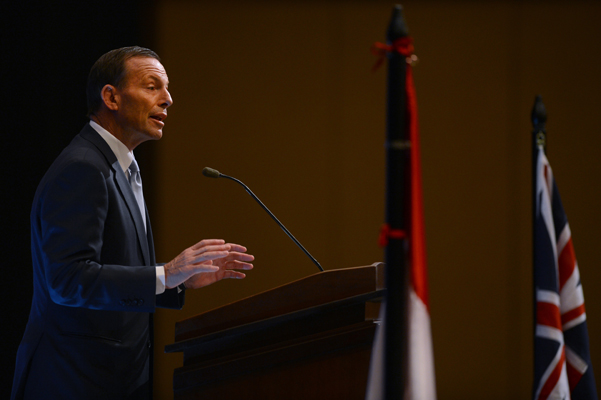Australian Prime Minister Tony Abbott has sought to downplay Indonesian concerns about his controversial new asylum policy, which could see boatpeople from countries such as Burma forcibly turned away by the navy, during a diplomatic visit to Jakarta this week.
Speaking to the press on Tuesday, Abbott said that Indonesian President Susilo Bambang Yudhoyono was equally committed to ending the “evil scourge” of people trafficking. It followed bilateral discussions between the two countries on Monday, which were overshadowed by Indonesian anger over Australia’s immigration plans.
“What was clear yesterday is that Indonesia is hardly less anxious to stop the people smuggling trade than we are and wants to cooperate fully under the Bali process to make that a reality,” said Abbott on Tuesday, referring to a 2002 agreement to tackle human trafficking in the Asia-Pacific.
The prime minster, who recently swept to office on a populist anti-immigration ticket, has stirred controversy by pledging to intercept and turn away asylum-seekers – many who come from Burma – arriving by boat to Australia.
The scheme, known as Operation Sovereign Borders, includes buying old shipping vessels from Indonesia to deter people traffickers from using them, and to pay Indonesian civilians to offer intelligence about smuggling networks.
But Abbott insisted that his policy had been misrepresented in the media as a plan to physically tow boats back to Indonesia, which is the main port of transfer for asylum-seekers heading to Australia.
“There’s a world of difference between turning boats around in Australian waters and the Australian navy towing them back to Indonesia,” said Abbott, blaming the media for distorting the truth in order to “generate a headline”.
The “tow-back” plan had provoked anger from Indonesian authorities who said it would encroach on their sovereignty and unfairly burden them with an influx of asylum-seekers. Abbott’s trip comes less than a week after 31 asylum-seekers from the Middle East drowned off the coast of Indonesia on their way to Australia.
A spokesperson for the UN’s refugee agency, UNHCR, told DVB that Australia and Indonesia need to work together to address the crisis.
“The challenge of irregular maritime movements is complex and cannot be resolved by any single country,” said Vivian Tan, regional spokesperson for UNHCR.
“All affected countries, including countries of origin, transit and destination, need to work together in a way that addresses the security concerns of governments as well as the humanitarian and protection needs of people moving irregularly through the region, including asylum-seekers and refugees.”
Abbott’s visit this week – which was accompanied by a large delegation of business representatives – has been viewed as an attempt to repair the two country’s economic and diplomatic ties.
But human rights groups say that it is insufficient for Abbott to renege on his contentious “tow-back” policy, given his continued commitment to turn away asylum-seekers.
[related]
“Australia’s policy to effectively deny consideration of refugee claims for persons arriving by boat is discriminatory and undermines refugee protections throughout the Asia-Pacific region,” Phil Robertson, deputy-Asia director of Human Rights Watch (HRW) told DVB.
“It [Australia] has an international obligation to fairly and transparently consider refugee claims made by boat arrivals and not just push this responsibility off to other states.”
It follows news that Abbott has vowed to press ahead with a plan to re-direct all future asylum-seekers to Papua New Guinea and Nauru, where they would be resettled if successful. The policy, which is already set to see at least 100 Rohingya refugees from Burma deported to Australia’s poorer Oceanic neighbours, has been criticised as “inhuman and degrading”.
Tens of thousands of Rohingya Muslims, who are denied citizenship in Burma, have fled the country since two bouts of communal clashes with Buddhists last year, which left nearly 140,000 displaced and 200 dead. Many of them head to Australia, where they hope to be resettled as refugees.



